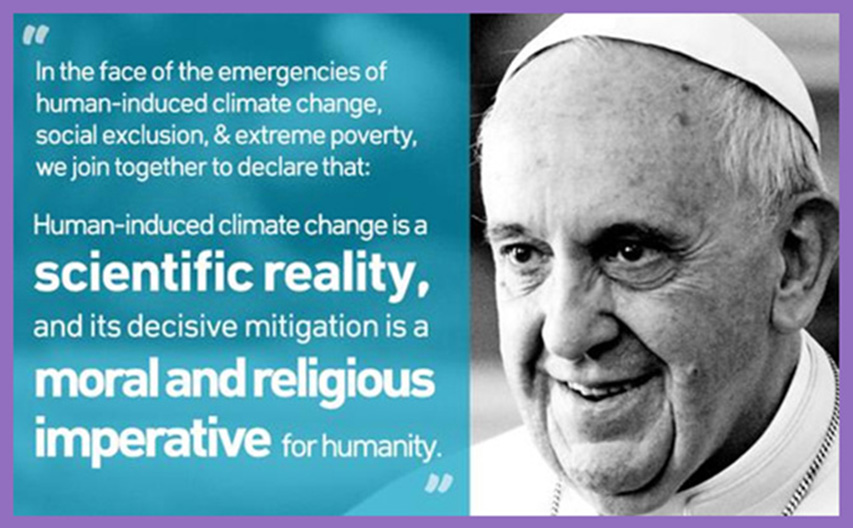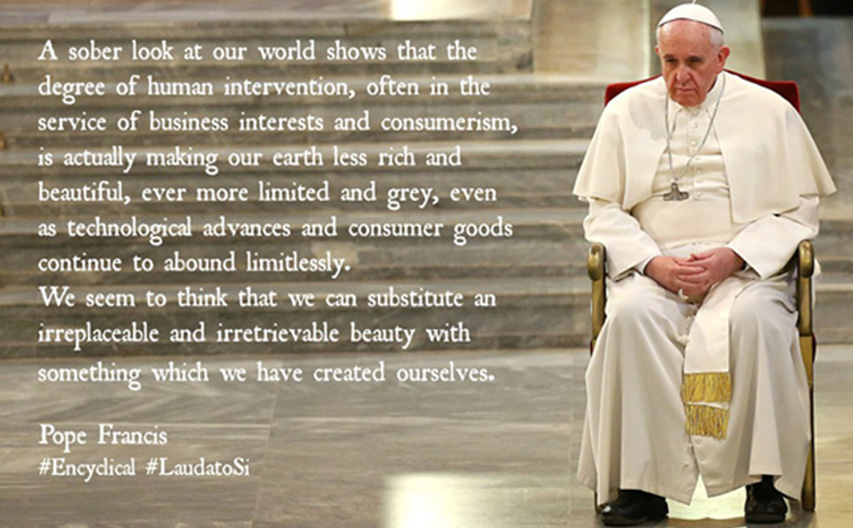
Hear The Poor Cry
by Augustine Veliath August 1 2015, 10:43 pm Estimated Reading Time: 5 mins, 42 secsA Very significant document has come out. It is a letter from Pope Francis addressed to everyone on this planet.
Pope Francis is head of the world’s largest religions community, the Catholic Church. He has a billion followers.
Such letters by the Pope are called encyclicals. This is this Pope’s second encyclical. The first one was partly drafted by his predecessor. Therefore this could be considered the one with the real stamp of this Argentinian Pope, the first one from the Third World and the first from the Americas that is the poorer side of the Americas.
What is special about this? First of all it is not about them, it is about us, all of us. It cannot get bigger than this. It is about us. all of us who walk on the earth, it is about earth and it is about the universe..
It is the first time a Pope has devoted an entire encyclical to the issue of environment. He says global warming is a major threat. He says it human activity that causes this threat. It is you and I and what we do is threatening the environment. It is time we have policies that reduce carbon emissions. We better find substitutes for fossil fuels and develop sources of renewable energy, says the encyclical.
He insists that the world must “hear both the cry of the earth and the cry of the poor.”

Who is Plundering the Earth?
The Wall Street Journal said that the encyclical accuses global market economy of plundering the Earth at the expense of the poor and of future generations. Special interests are holding back policy responses. The rich ( read North) owes the poor (read South) “an ecological debt.” The Pope positions global warming as one of the principal challenges facing humanity in our day” and warns of “unprecedented destruction of ecosystems, with serious consequence for all of us” if prompt climate change mitigation efforts are not undertaken. He has very thoughtful words to say about failures of markets and banks. He questions the absolute power the financial systems have occupied. He sees the need for a new economy built on ethical principles.
Governments have made people pay for failures of banks and markets. “Humanity is called to recognize the need for changes of lifestyle, production and consumption, in order to combat this warming or at least the human causes which produce or aggravate it,” he adds. Business he says is a noble vocation. But it has “outsized influence over the political process. His statements are research based, even the OECD agrees that curbing certain kinds bank lending could ameliorate income equality around the world and increase economic growth.
Environmental Sin
First time perhaps in the human history Pope Francis has introduced a powerful new phrase the enviornmental sin. What is more he has linked it to the the violence present in our hearts, wounded by sin, is also reflected in the symptoms of sickness evident in the soil, in the water, in the air and in all forms of life.
He has objected to the hundreds of millions of tons of waste generated, much of it non-biodegradable, highly toxic and radioactive. “The earth, our home, is beginning to look more and more like an immense pile of filth. In many parts of the planet, the elderly lament that once beautiful landscapes are now covered with rubbish.”
A very solid scientific consensus indicates that we are presently witnessing a disturbing warming of the climatic system. In recent decades this warming has been accompanied by a constant rise in the sea level and, it would appear, by an increase of extreme weather events, even if a scientifically determinable cause cannot be assigned to each particular phenomenon.
Humanity is called to recognize the need for changes of lifestyle, production and consumption, in order to combat this warming or at least the human causes which produce or aggravate it. It is true that there are other factors (such as volcanic activity, variations in the earth’s orbit and axis, the solar cycle), yet a number of scientific studies indicate that most global warming in recent decades is due to the great concentration of greenhouse gases (carbon dioxide, methane, nitrogen oxides and others) released mainly as a result of human activity.
Vanishing Bio diversity
Our bio diversity is vanishing. Thousands of plant and animal species our children will never see, because they have been lost for ever.
Our activities are making our earth less rich and less beautiful. According to the Pope “the alliance between the economy and technology ends up sidelining anything unrelated to its immediate interests. The Pope criticises consumerism and irresponsible development, and calls for “swift and unified global action” to combat environmental degradation and climate change (also known as global warming).
We suffer from apathy, the reckless pursuit of profits, excessive faith in technology and political shortsightedness”. It “unambiguously accepts the scientific consensus that changes in the climate are largely man-made”[7] and states that “climate change is a global problem with grave implications: environmental, social, economic, political and for the distribution of goods.

Leading Moral Voice
The encyclical highlights the role of fossil fuels in causing climate change and states that developed nations are morally obligated to assist developing nations in combating the climate-change crisis. Poor nations, the pontiff says, are ill-prepared to adapt to the effects of climate change and will bear the brunt of its effects. Linking the issues of poverty, which has been a major issue in his papacy, and the environment. The encyclical is wide ranging, including mentions of such topics as urban planning, agricultural economics, and biodiversity. The encyclical’s comments on climate change are consistent with the scientific consensus on climate change.
With this encyclical eocology and environmentalism has claimed pride of place on a par with the dignity of human life and economic justice as a cornerstone of Catholic social teaching. With this encyclical the Catholic Church has become the leading moral voice in the press to combat global warming and the consequences of climate change.” “Economic powers continue to justify the current global system where priority tends to be given to speculation and the pursuit of financial gain,” he writes. “As a result, whatever is fragile, like the environment, is defenseless before the interests of the deified market, which become the only rule.”




-173X130.jpg)
-173X130.jpg)


-173X130.jpg)
-173X130.jpg)
-173X130.jpg)
-173X130.jpg)